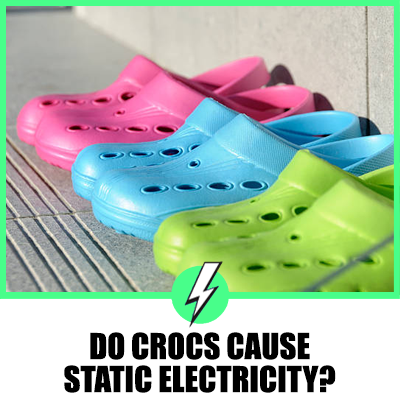Do Crocs Cause Static Electricity?
Crocs, the popular slip-on plastic clogs, have been a topic of debate for quite some time.
While they are praised for their comfort and unique design, they have also been linked to an unexpected phenomenon – static electricity.

Contents
Can Crocs Cause Static?
According to several discussions and reports, Crocs can indeed cause static electricity.
A Swedish hospital, Blekinge, even considered banning its staff from wearing Crocs.
They blamed the shoes for at least three incidents in which respirators and other machines malfunctioned due to static electricity.
The hospital spokesperson, Bjorn Lofqvist, even went as far as to say that hospital staff wearing the clogs could turn into “a cloud of lightning” because of the static electricity.
This phenomenon is not limited to Sweden.
In the UK and the US, many Crocs wearers have reported experiencing static shocks.
These incidents often occur in dry environments or when the wearer is walking on carpets or synthetic materials.
How do I stop my Crocs from getting static?
While the static electricity caused by Crocs can be a nuisance, there are ways to reduce it.
One method is to use anti-static sprays that can be applied to the shoes.
These sprays work by increasing the conductivity of the shoe’s material, allowing electric charges to dissipate more easily.
Another method is to wear cotton socks with your Crocs.
Cotton is a natural material that does not build up static electricity as much as synthetic materials.
By wearing cotton socks, you can reduce the amount of static electricity that builds up on your shoes.
Does Rubber Shoes Cause Static?
Rubber shoes, like Crocs, can indeed cause static electricity.
This is because rubber is an insulator, which means it does not easily allow electricity to pass through it.
When you walk, especially on carpets or synthetic materials, your shoes can build up an electric charge.
This charge can then be released as a static shock when you touch a conductive object, like a metal doorknob.
However, it’s important to note that not all rubber shoes are created equal.
The amount of static electricity that a shoe can generate depends on several factors.
These include the specific type of rubber used, the shoe’s design, and the environment in which it’s worn.
What are the Negative Effects of Crocs?
Apart from the static electricity issue, Crocs have also been criticized for their lack of support.
Some experts argue that they are not suitable for long-term use as they do not provide adequate support for the arch of the foot.
This lack of support can lead to foot pain and other issues over time.
However, many people continue to wear Crocs due to their comfort and ease of use.
In addition to foot pain, wearing Crocs for extended periods can also lead to other health issues.
These include problems with posture, joint pain, and even an increased risk of accidents due to the shoe’s loose fit and lack of grip.
Insights from Online Discussions
Online discussions reveal a variety of experiences with Crocs and static electricity.
Some users on forums have reported getting shocked frequently when wearing Crocs, especially in certain environments like grocery stores.
Others have noted that while they do experience static shocks, the comfort of the shoes outweighs this minor inconvenience.
In conclusion, while Crocs can cause static electricity, the severity of the issue can vary depending on the individual and the environment.
If you are concerned about static electricity while wearing Crocs, consider using anti-static sprays or wearing cotton socks with your shoes.
As always, if you experience any discomfort or issues while wearing Crocs, it may be best to consult with a healthcare professional.
Whether you’re in the UK or the US, the message remains the same: while Crocs are comfortable and convenient, they can cause static electricity.
Always be aware of your environment and take necessary precautions when wearing these shoes.
Please note that this article is intended for a general audience in the UK and US and does not constitute medical or safety advice.
Always consult with a professional for advice related to footwear and static electricity.





